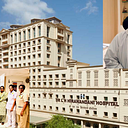Managing Post-Transplant Care: Tips for a Successful Kidney Transplant Journey

Undergoing a kidney transplant is a life-changing event that offers a new lease on life for individuals with end-stage renal disease. However, a successful kidney transplant requires diligent post-transplant care and lifestyle adjustments to ensure the long-term health and functioning of the transplanted kidney, as per Dr Sujit Chatterjee, CEO Hiranandani Hospital. This blog will explore essential tips for managing post-transplant care and maximizing the chances of a successful kidney transplant journey. By following these guidelines, recipients can safeguard their health, minimize the risk of complications, and enjoy the full benefits of their transplant.
Importance of Immunosuppressant Medications
After a kidney transplant, recipients are prescribed immunosuppressant medications to prevent organ rejection. Adhering to the medication regimen as prescribed by the healthcare team is crucial. These medications suppress the immune system and help protect the transplanted kidney from rejection. Skipping doses or altering the dosage without medical advice can increase the risk of rejection.
Understanding Potential Side Effects
Immunosuppressant medications can have side effects such as increased susceptibility to infections, weight gain, bone thinning, and high blood pressure. Transplant recipients need to be aware of these potential side effects and report any concerning symptoms to their healthcare team promptly. Regular monitoring and adjustment of medications can help manage these side effects effectively.
Importance of Regular Follow-up Appointments
Frequent follow-up appointments with the transplant team are necessary to monitor the progress of the transplanted kidney and detect any potential issues early on. These appointments may include blood tests, imaging studies, and consultations with various specialists. Regular communication with the healthcare team ensures prompt intervention and adjustments to the treatment plan, if necessary.
Balanced and Kidney-Friendly Diet
Following a kidney-friendly diet is essential for the long-term success of the transplant. This typically involves limiting sodium, potassium, and phosphorus intake while ensuring an adequate protein intake, healthy fats, and fiber intake. A registered dietitian with experience in kidney health can provide personalized dietary recommendations.
Hydration and Fluid Intake
Maintaining proper hydration is important for kidney function and overall health. Transplant recipients should strive to drink adequate fluids, as their healthcare team recommends, while considering any fluid restrictions based on their circumstances.
Regular Exercise and Physical Activity
Regular exercise and physical activity help maintain a healthy weight, improve cardiovascular health, and boost overall well-being. However, it is important to consult with the healthcare team at LH Hiranandani Hospital kidney transplant before starting any exercise regimen to ensure it is safe and suitable for individual circumstances.
Managing Stress and Mental Well-being
Managing stress is crucial for overall health and can positively impact the success of a kidney transplant. Taking part in activities that promote mental health and reduce stress, such as deep breathing exercises, meditation, and mindfulness, can help.
Avoiding Harmful Substances
Transplant recipients should avoid smoking, excessive alcohol consumption, and recreational drug use. These substances can harm overall health and interfere with the transplanted kidney’s functioning.
Building a Strong Support System
A strong support system consisting of family, friends, and support groups can significantly contribute to a successful kidney transplant journey. These individuals can provide emotional support, assist with practical aspects of post-transplant care, and help navigate any challenges.
Communicating with the Healthcare Team
Maintaining open and effective communication with the Hiranandani Hospital Kidney transplant healthcare team is vital for post-transplant care. Transplant recipients should feel comfortable discussing concerns, symptoms, or questions with their healthcare providers. Regularly updating the team about any changes in health status or medication side effects can help them make informed decisions and adjust the treatment plan.
Additionally, staying informed about the latest advancements in kidney transplant care and participating in educational programs or support groups can provide valuable knowledge and a sense of community. By actively engaging with the healthcare team and seeking support, transplant recipients can ensure they receive the best possible care and support throughout their kidney transplant journey.
Conclusion
Managing post-transplant care is crucial for the long-term success of a kidney transplant. By adhering to medication regimens, attending follow-up appointments at Hiranandani hospital kidney, maintaining a healthy lifestyle, and building a supportive network, transplant recipients can reduce complications and optimize kidney function. Committing to post-transplant care is a lifelong journey that requires dedication and collaboration with the healthcare team. By following the tips outlined in this blog, individuals can confidently navigate the post-transplant period and enjoy the transformative benefits of a successful kidney transplant.
